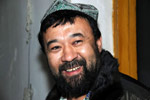Society
Army deploys after Bahrain police raid
Updated: 2011-02-18 07:35
(Agencies)
MANAMA - Troops took control of Manama on Thursday after riot police stormed an anti-government protest camp at dawn and fought demonstrators on the streets, killing four people in Bahrain's worst violence in decades.
Foreign Minister Sheikh Khaled bin Ahmed al-Khalifa said police action pulled Bahrain back from what he called the brink of a sectarian abyss. "So it was a very important step that had to happen. Police took every care possible."
Police cleared the capital's Pearl Square of mainly Shi'ite protesters demanding more say in the Sunni-ruled island kingdom.
"This is an atrocity," Abdul Jalil Khalil, a senior member of the main Shi'ite party Wefaq told Reuters. "Whoever took the decision to attack the protest was aiming to kill."
Health Minister Faisal bin Yaqoob al-Hamer said three people were killed and 231 hurt in the police operation and an opposition MP told Reuters later a fourth person had died of his wounds.
The crackdown by the Bahraini authorities appeared designed to snuff out the protests before they could gather momentum, unlike the sustained unrest that unseated Egypt's Hosni Mubarak.
Inspired by popular revolts in Tunisia and Egypt, the unrest in Bahrain, home to the U.S. Navy's Fifth Fleet, will alarm Saudi Arabia and the United States, which both see the island's al-Khalifa dynasty as a bulwark against Shi'ite Iran.
"I'm not saying that Bahrain is on the brink (but) should it become clear that the regime is in danger, the Saudis will step in," said Gala Riani, senior Middle East analyst at IHS Global Insight in London.
The Shi'ite bloc Wefaq, which holds 17 of parliament's 40 seats, planned to quit the assembly in protest. MP Ibrahim Mattar said his group and six others had demanded the government resign and make way for a new national unity cabinet.
Jane Kinninmont, an analyst at the Economist Intelligence Unit, said Wefaq was a cautious group trying to work within the system. "If they feel they can no longer do that then this is a sign of increasing polarization," she said.
"I assume there are divisions within the government ... (and that) the reformers are worried the crackdown has gone too far. Clearly these images of Bahrain are not going to be good for foreign investment," Kinninmont said.
The protesters want the Sunni ruling family to relinquish control over top government posts and address the grievances of Shi'ites over economic hardship, lack of political freedom and discrimination in jobs in public service and the military.
Dilemma for rulers
"The question is whether they will be able to implement general reform, limiting the power of the king and so on. If they do that, in the long term, they are putting their own dominance and Sunni dominance at risk," Riana said, adding the authorities had long experience of dealing with unrest.
Health Minister Hamer said three people had been killed and 231 hurt in the police operation, and 36 people were still receiving hospital treatment.
"It is most unfortunate," he told Reuters at the bedside of a doctor badly hurt during the clash.
Opposition MP Mattar said later a fourth person had died of his injuries.
"He just died now, 20-30 minutes ago. He had wounds in the leg," he told Reuters, adding that it was not clear whether the man was injured in Pearl Square or in later clashes elsewhere.
The economic effects of the unrest are being felt, the King having already paid out generous allowances to families in an attempt to appease the population. Fitch ratings agency warned it might downgrade Bahrain's credit ratings in a few months.
A statement from Bahrain's defence forces, quoted by the Qatar news agency, said about 50 security force members had been wounded by demonstrators using "swords, knives and daggers".
"Security forces had to fire teargas and stun grenades to avoid losses," the statement said, adding the military had deployed in Manama "under orders to take all necessary measure to preserve peace and stability for citizens and residents".
King Hamad bin Isa al-Khalifa offered condolences to relatives of two men killed earlier this week and promised to investigate. Thursday's deaths took the total this week to six.
The police raid was short and sharp. Within 20 minutes protesters had fled, leaving tents, blankets and rubbish behind them as teargas wafted through the air, a Reuters reporter said.
A teenager shepherded a sobbing woman into a car, saying she had been separated from her two-year-old daughter in the chaos.
Garbage cleared
Helicopters clattered over the city and tow-trucks dragged away cars abandoned by protesters, their tyres squealing on the Tarmac because the brakes were still on.
Army troops in beige camouflage replaced riot police at Pearl Square and Asian municipal workers cleared away garbage.
On Wednesday, the Wefaq party demanded a new constitution that would move the country toward democracy.
"We're not looking for a religious state. We're looking for a civilian democracy ... in which people are the source of power, and to do that we need a new constitution," its secretary-general Sheikh Ali Salman told a news conference.
Elsewhere in Manama, life went on as usual. In one smart area, foreigners sat in cafes or strolled in jogging clothes.
Formula One motor racing head Bernie Ecclestone said the season-opening Bahrain Grand Prix on March 13 may have to be called off because of the unrest. "We'll make a decision by Tuesday or Wednesday," he said.
The religious divide between Bahrain's leaders and most of their subjects has led to sporadic unrest since the 1990s, making the country more prone to unrest than other Gulf states where rulers tacitly use oil wealth to buy political submission.
King Hamad introduced a new constitution giving Bahrainis more political rights a decade ago, but the opposition says he has not gone far enough to introduce democracy. Most of the cabinet are royal family members.
The king's uncle, Khalifa bin Salman al-Khalifa, has been prime minister since the modern state was founded in 1971. Wefaq wants him fired and replaced by an elected prime minister.
"The people demand the fall of the regime," protesters chanted at the hospital, echoing a slogan of Egyptians who ousted Mubarak last week after an 18-day revolt.
Specials

Spring Festival
The Spring Festival is the most important traditional festival for family reunions.

Top 10
A summary of the major events both inside and outside China.

A role model
Alimjan Halik had been selected as the "Cyberspace Personality Who Moved the Hearts of the Chinese in 2010".